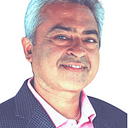OD Odyssey at Stanford University Medical Center — IV
[Continued from OD Experiments at Stanford University Medical Center: Accelerating Team Development — III…]
As part of our development in the OD group we were encouraged to take different kinds of self-development courses related to OD. I ended up doing quite a few, including the Forum and some related courses that were derivations of Warner Erhard’s EST, NLP and Hypnosis, an intense Acting Workshop at Esalen, Appreciate Inquiry intensives, a T-Group through the OB Department at Stanford’s GSB, and a Native American Vision Quest. Each provided a different experience and facilitated clarity on how what I was developing was different.
The idea of the Forum fascinated me because I could initially not fathom how any personal transformation could take place for 200–300 people in a room over a 3–4 day period. But in fact, I found it to be a powerful experience precisely because there are universal patterns common to people that one experiences in oneself, as any single person is being worked on at center of the room by the facilitator. For me the highpoint of the Forum was when I experienced the sense of a vaster emptiness when it became clear that a lot of what I considered to be me was just the material from which parts of all of us are made.
The MAX acting workshop at Esalen has been declared by a few to be an initiation. Like the Forum it had long hours that lasted close to 1 week. One acts out one’s shortcomings, self-perceived or perceived by others, or acts out a desired dream version of oneself, and as a result of continuing to delve on these ways of being something is released in the former, or something new comes in in the latter, and one becomes something different as a result.
The NLP and hypnosis course was over a 3-month period and involved exercising the power of imagination. In particular one focused on detailed sense-memories that one may have experienced in times of personal lows, or new sense-reactions that will allow one to experience the same thing differently in the future. In a sense there is a programming of detailed new responses and short-cut cues to achieve these responses. When I took Tony Robbins 4-day course some time later I found the principles and approach to be very similar.
The T-Group was another intense 3+ day meeting with no agenda, and with about 15 other people, often going past midnight. The one guiding principle was to structure response from emotion. Contribution to the meeting usually involved stating how what someone had just said made one feel. The focus on emotions and feelings for close to 3+ days loosened the heart and at the end of it I felt and reportedly looked much softer as well.
The experience of Appreciate Inquiry was about creating a positive flow in oneself based on recollection of past highs, and then leveraging that energy to live in new moments, and creating new possibilities from there.
The Vision Quest was about getting a vision through altering perception by not eating or drinking for a few days. My experienced vision had to do with learning to move from an individual basis of action to a collective basis. This is something still in process and I find that the power of love is critical in making this happen in the right way. A collectivity that is bound by selfless love is a vision worth striving for.
Needless to say these experiences were highs and continued to push the boundaries of self-experience and self-definition. These reinforced my already native urge to want to create something as radical and real and unique. I continue to be quite consumed by the notion of combining patterns, always-on web-based environments, and truthful introspection, to understand fractal imprints and how this will shape individual and collective destiny.
Emotion is the lynchpin in this because it is a direct lens into the fractal structures that drive an individual’s life. Hence I envisioned people having to become very familiar with many states of being they are experiencing along the vital, mental, and physical dimensions. Mapping of these emotions in turn gives insight into the fractal imprints that animate people, teams, and organizations at more complex scale. That is how I designed the web-based environments.
Looking at how others make one feel is not enough. One must also look at why one feels the way one does. Looking at why one feels the way one does is good. Looking and looking until one sees that the structure responsible for the feeling can be dissolved is better. Programming various futures is good. Allowing the future to organically emerge because one has done the work to create adequate space in oneself is even better.
Exceptional futures demand exceptional work. There are simply no shortcuts. Every change program worth its weight has to break habits, rules, and stretch people and groups to new limits.
(To be continued…)
